Garden Maintenance in Fulham
Welcome to Expert Garden Maintenance in Fulham
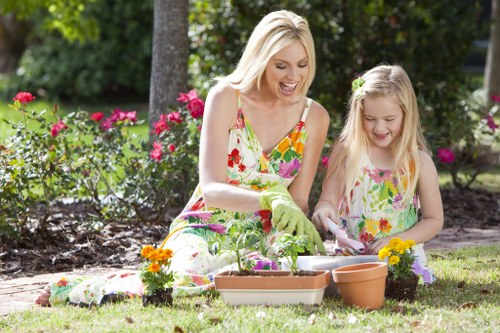
Maintaining a beautiful garden in Fulham requires dedication, knowledge, and the right set of skills. Whether you’re a seasoned gardener or a novice, proper garden maintenance can transform your outdoor space into a serene and aesthetically pleasing haven.
In Fulham, where property values are high and curb appeal is paramount, taking care of your garden not only enhances the beauty of your home but also increases its market value. A well-maintained garden reflects the care and attention you put into your property, making it more attractive to potential buyers or guests.
But what does garden maintenance in Fulham entail? It covers a wide range of activities, from regular tasks like mowing and weeding to more specialized services such as pruning, pest control, and seasonal planting. Understanding these tasks and how to perform them effectively is key to keeping your garden healthy and vibrant throughout the year.
Understanding Garden Maintenance
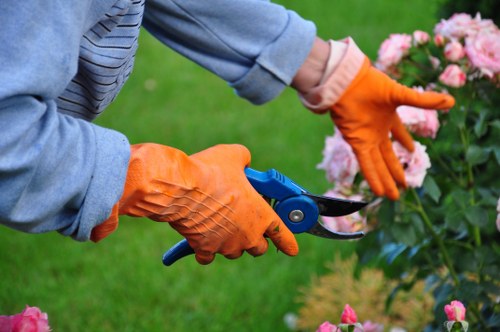
What is Garden Maintenance?
Garden maintenance involves a series of tasks aimed at preserving and enhancing the beauty and health of your garden. This includes regular upkeep, such as watering, mowing, and weeding, as well as more intensive work like pruning, fertilizing, and pest management.
In Fulham's climate, which features mild winters and warm summers, garden maintenance needs to be tailored to the specific conditions of each season. This ensures that plants thrive, lawns remain lush, and outdoor spaces stay inviting all year round.
Professional garden maintenance services in Fulham can take care of these tasks for you, providing expertise and saving you time. However, with the right guidance, many garden enthusiasts can manage their own gardens effectively.
- Regular mowing and edging
- Weeding and mulching
- Pruning and trimming
- Seasonal planting and soil preparation
- Pest and disease control
Seasonal Garden Maintenance
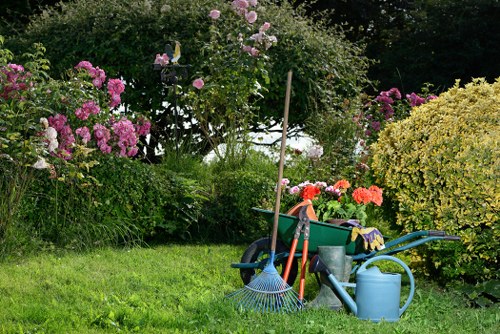
Spring Maintenance
Spring is a critical time for garden maintenance in Fulham. As temperatures rise and plants begin to grow, it's essential to prepare your garden for the upcoming seasons.
Key tasks include:
- **Planting** new flowers and shrubs
- **Soil preparation** by adding compost or fertilizers
- **Pruning** dead branches and shaping plants
- **Lawn aeration** to improve soil health
By addressing these tasks in spring, you set a strong foundation for a thriving garden throughout the year.
Summer Maintenance
Summer presents its own set of challenges, such as heat and pests. Proper maintenance during this season ensures your garden remains healthy and vibrant.
Essential summer tasks include:
- **Regular watering** to keep plants hydrated
- **Pest control** to protect against common garden pests
- **Deadheading** spent flowers to encourage new growth
- **Mulching** to retain soil moisture and reduce weeds
By staying on top of these tasks, you can enjoy a lush and colorful garden even during the hottest months.
Autumn and Winter Maintenance
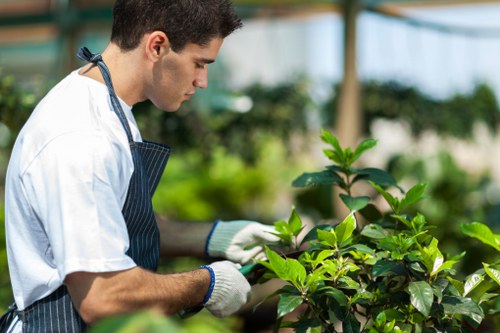
Autumn Maintenance
As autumn approaches, it's important to prepare your garden for the colder months ahead. This involves several key activities to protect your plants and ensure a smooth transition into winter.
Autumn tasks include:
- **Leaf removal** to prevent fungal growth
- **Planting** autumn blooms and bulbs for spring growth
- **Pruning** perennials and shrubs to shape them
- **Composting** fallen leaves to enrich the soil
Winter Maintenance
Winter may seem like a quiet time for gardens, but proper maintenance is still crucial. Protecting your garden during the colder months helps ensure its health and vitality when spring arrives.
Winter tasks include:
- **Protecting plants** with mulches or covers
- **Pruning** dormant trees and shrubs
- **Cleaning** garden tools and equipment
- **Planning** for the next planting season
By diligently maintaining your garden in autumn and winter, you set the stage for a vibrant and thriving garden in the years to come.
Choosing the Right Plants for Fulham Gardens
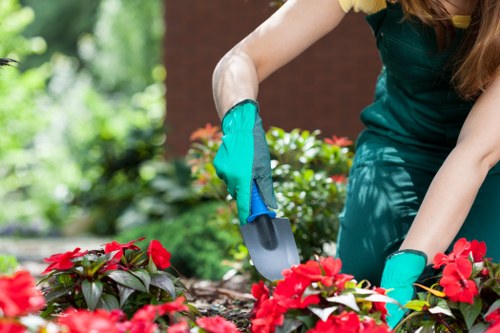
Climate Considerations
Fulham's temperate climate is ideal for a wide variety of plants. When selecting plants for your garden, it's essential to consider factors like temperature ranges, rainfall, and sunlight exposure.
Opt for plants that are well-suited to Fulham's climate to ensure they thrive with minimal effort. Some popular choices include:
- **Roses** for their timeless beauty
- **Lavender** for fragrance and drought tolerance
- **Hostas** for shade-loving areas
- **Hydrangeas** for colorful summer blooms
Soil Types and Preparation
The quality of your soil plays a significant role in the success of your garden. Fulham gardens typically have well-draining soil, but it's important to test your soil's pH and nutrient levels to determine if any amendments are needed.
Key steps in soil preparation include:
- **Testing soil pH** and adjusting it as necessary
- **Adding compost** to improve soil structure and fertility
- **Incorporating organic matter** to enhance drainage and aeration
- **Removing weeds** and debris before planting
By ensuring your soil is in optimal condition, you provide a strong foundation for healthy plant growth.
Professional vs DIY Garden Maintenance

Advantages of Hiring Professionals
Hiring professional garden maintenance services in Fulham offers numerous benefits. Professionals bring expertise, experience, and the right tools to handle any garden task efficiently.
- **Time-saving**: Professionals handle all maintenance tasks, freeing up your time.
- **Expert knowledge**: They understand local plant varieties, soil conditions, and climate considerations.
- **Quality results**: Professional maintenance ensures your garden looks pristine and healthy.
- **Comprehensive services**: From lawn care to pest control, professionals offer a wide range of services.
When to DIY
While professional services offer many advantages, some garden tasks can be easily managed by homeowners. DIY maintenance is ideal for those who enjoy gardening and have the time to dedicate to it.
- **Basic tasks**: Mowing, watering, and weeding can be handled by yourself.
- **Planting seasonal flowers**: Adding new flowers and shrubs is a rewarding DIY activity.
- **Simple pruning**: Light trimming of plants and hedges can be done without professional help.
- **Garden design**: Personalizing your garden layout and selecting plant placements.
Balancing professional services with DIY tasks can provide the best of both worlds, ensuring your garden remains beautiful and manageable.
Sustainable Garden Practices

Eco-friendly Gardening
Adopting sustainable gardening practices not only benefits the environment but also enhances the long-term health of your garden. Eco-friendly gardening focuses on reducing waste, conserving resources, and promoting biodiversity.
- **Composting** organic waste to create nutrient-rich soil
- **Using native plants** that require less water and maintenance
- **Implementing natural pest control** methods
- **Reducing chemical usage** by opting for organic fertilizers and pesticides
Water Conservation
Water is a precious resource, and conserving it in your garden is both environmentally responsible and cost-effective. Implementing water-saving techniques ensures your garden remains lush without excessive water usage.
Installing Rainwater Harvesting Systems
Rainwater harvesting involves collecting and storing rainwater for later use in your garden. This sustainable practice reduces reliance on municipal water supplies and provides plants with naturally soft water.
- **Rain barrels**: Simple containers that collect rainwater from gutters.
- **Swales and trenches**: Landscape features that capture and redirect rainwater.
- **Automated irrigation systems**: Efficient watering systems that minimize waste.
By incorporating these methods, you can significantly reduce your garden's water consumption while maintaining its beauty.
Mulching for Moisture Retention
Mulching involves covering the soil with organic or inorganic materials to retain moisture, suppress weeds, and regulate soil temperature. Common mulches include wood chips, straw, and gravel.
- **Benefits of mulching**: Enhances soil health, reduces evaporation, and improves plant growth.
- **Choosing the right mulch**: Select materials that complement your garden's aesthetic and plant needs.
- **Proper application**: Apply mulch in a consistent layer around plants, avoiding direct contact with stems or trunks.
Enhancing Your Garden’s Aesthetic
Design and Layout
A well-designed garden is both functional and visually appealing. Planning your garden layout involves considering elements like plant placement, pathways, and focal points to create a harmonious outdoor space.
Creating Focal Points
Focal points draw attention and add interest to your garden. These can include:
- **Water features**: Ponds, fountains, or birdbaths that add tranquility.
- **Sculptures**: Artistic pieces that reflect your personality.
- **Statement plants**: Unique or vibrant plants that stand out.
Pathways and Access
Pathways guide visitors through your garden and can be designed using various materials like stone, gravel, or wood. They not only provide accessibility but also enhance the garden's overall structure.
- **Choosing materials**: Select durable and aesthetically pleasing materials that match your garden's style.
- **Designing routes**: Create winding paths to encourage exploration and add depth.
- **Safety considerations**: Ensure paths are well-lit and free of obstacles.
Thoughtful design and layout contribute significantly to the garden's beauty and functionality.
Lighting and Accessories
Garden lighting and accessories add another layer of beauty, especially during evening hours. Proper lighting can highlight key features and create a welcoming atmosphere.
- **Solar lights**: Eco-friendly options that are easy to install.
- **String lights**: Perfect for creating a cozy ambiance.
- **Spotlights**: Ideal for highlighting sculptures or focal plants.
Choosing the Right Lighting
Select lighting that complements your garden's design and meets your practical needs. Consider factors like brightness, energy efficiency, and placement when choosing garden lights.
- **LED lights**: Long-lasting and energy-efficient.
- **Motion-sensor lights**: Enhance security while providing illumination.
- **Decorative lanterns**: Add charm and character to outdoor spaces.
Integrating Accessories
Accessories like benches, garden statues, and decorative pots can enhance your garden's appeal. Carefully selected accessories can make your garden more inviting and personalized.
- **Benches and seating**: Provide spots for relaxation and enjoyment.
- **Garden art**: Reflects your taste and adds uniqueness.
- **Planters and pots**: Versatile options for adding color and variety.
Pest and Disease Management
Identifying Common Pests in Fulham Gardens
Maintaining a healthy garden involves vigilant pest and disease management. In Fulham, gardens may encounter various pests that can damage plants and disrupt the ecosystem.
- **Aphids**: Small insects that feed on plant sap, causing leaves to curl and wilt.
- **Slugs and snails**: Mollusks that can decimate young plants and seedlings.
- **Slaters and beetles**: Can defoliate plants and weaken their structure.
- **Spider mites**: Tiny arachnids that create webs and suck plant juices.
Preventative Measures
Preventing pest infestations is more effective than dealing with them after they occur. Implement these strategies to keep your garden pest-free:
- **Regular inspections**: Monitor plants for signs of pests or damage.
- **Encouraging beneficial insects**: Attract natural predators like ladybugs and lacewings.
- **Proper sanitation**: Remove plant debris and weeds that can harbor pests.
- **Crop rotation**: Rotate plant species to disrupt pest life cycles.
Natural and Chemical Controls
When pests do appear, it's important to address them promptly. Both natural and chemical controls can be effective, depending on the situation.
- **Neem oil**: A natural pesticide that disrupts the life cycle of many pests.
- **Insecticidal soaps**: Safe for use on most plants and effective against soft-bodied insects.
- **Beneficial nematodes**: Microscopic worms that target and kill soil-dwelling pests.
- **Chemical pesticides**: Use sparingly and as a last resort to minimize environmental impact.
Choosing the right method depends on the type of pest, the severity of the infestation, and your personal preferences regarding garden care.
Lawn Care in Fulham
Maintaining a Lush Lawn
A healthy, green lawn is the cornerstone of any beautiful garden. Proper lawn care involves several key practices that ensure your grass remains thick, vibrant, and resilient.
- **Mowing** regularly to maintain an optimal grass height.
- **Fertilizing** to provide essential nutrients.
- **Aerating** the soil to improve air and water penetration.
- **Overseeding** to fill in bare spots and encourage denser growth.
Mowing Techniques
Proper mowing is essential for lawn health. Follow these tips to mow effectively:
- **Maintain the right height**: Avoid cutting more than one-third of the grass blade at a time.
- **Use sharp blades**: Ensures clean cuts and reduces stress on the grass.
- **Vary mowing patterns**: Prevents soil compaction and encourages even growth.
- **Mow regularly**: Keeps the lawn neat and prevents weed growth.
Fertilization Schedule
Fertilizing your lawn provides the nutrients it needs to thrive. Create a fertilization schedule based on your grass type and local climate conditions.
- **Spring**: Apply a balanced fertilizer to support new growth.
- **Summer**: Use a slow-release fertilizer to maintain color and resilience.
- **Autumn**: Fertilize to prepare the lawn for winter and promote root growth.
- **Avoid over-fertilizing**: Prevents nutrient runoff and reduces the risk of pests.
Consistent fertilization helps maintain a robust and healthy lawn throughout the year.
Pruning and Trimming
Importance of Pruning
Pruning is a vital aspect of garden maintenance that involves removing dead or overgrown branches from plants and trees. Proper pruning encourages healthy growth, improves plant structure, and enhances overall garden aesthetics.
- **Promotes air circulation**: Reduces the risk of fungal diseases.
- **Encourages new growth**: Stimulates the development of fresh shoots and blooms.
- **Maintains shape**: Keeps plants looking tidy and well-structured.
- **Prevents damage**: Removes branches that could harm property or hinder other plants.
Pruning Techniques
Effective pruning requires the right techniques to avoid damaging plants. Follow these guidelines for best results:
- **Use clean tools**: Prevents the spread of diseases.
- **Cut at the right location**: Make cuts just above a bud or lateral branch.
- **Remove no more than 25% of the plant**: Ensures the plant’s health and vigor.
- **Prune at the appropriate time**: Different plants have optimal pruning seasons.
Tools of the Trade
Having the right tools makes pruning easier and more effective. Essential pruning tools include:
- **Pruning shears**: For cutting small branches and stems.
- **Loppers**: Ideal for thicker branches.
- **Pruning saws**: For larger branches and trees.
- **Hedge trimmers**: For shaping hedges and shrubs.
Investing in quality tools ensures precise cuts and prolongs the lifespan of your equipment.
Soil Health and Fertilization
Enhancing Soil Quality
Healthy soil is the foundation of a thriving garden. It provides essential nutrients, supports plant roots, and promotes beneficial microbial activity.
- **Organic matter**: Compost and manure improve soil structure and fertility.
- **pH balance**: Maintaining the right pH level ensures optimal nutrient uptake.
- **Aeration**: Prevents soil compaction and enhances root growth.
- **Mulching**: Retains moisture and suppresses weeds.
Effective Fertilization Practices
Fertilizing your garden replenishes the nutrients that plants need to grow strong and healthy. Follow these practices for effective fertilization:
- **Choose the right fertilizer**: Select based on plant needs and soil tests.
- **Apply at the right time**: Timing is crucial for nutrient absorption.
- **Follow recommended rates**: Prevents over-fertilization and environmental harm.
- **Use slow-release fertilizers**: Provides sustained nutrient availability.
Organic vs Synthetic Fertilizers
Choosing between organic and synthetic fertilizers depends on your gardening philosophy and specific needs.
- **Organic fertilizers**: Derived from natural sources, improve soil health, and are environmentally friendly.
- **Synthetic fertilizers**: Provide immediate nutrient availability but can harm soil microorganisms if overused.
- **Combination approach**: Use organic fertilizers for long-term soil health and synthetic ones sparingly for quick fixes.
Balancing both types can lead to a healthy and productive garden.
Pest Control and Management
Integrated Pest Management (IPM)
Integrated Pest Management (IPM) is a sustainable approach to controlling pests by combining biological, cultural, physical, and chemical tools in a way that minimizes economic, health, and environmental risks.
- **Biological controls**: Utilizing natural predators like birds and beneficial insects.
- **Cultural controls**: Practices such as crop rotation and planting pest-resistant varieties.
- **Physical controls**: Barriers, traps, and manual removal of pests.
- **Chemical controls**: Applying pesticides judiciously when necessary.
Natural Pest Deterrents
Using natural deterrents reduces the need for chemical pesticides and promotes a healthier garden ecosystem.
- **Companion planting**: Growing certain plants together to repel pests (e.g., marigolds with tomatoes).
- **Herbal sprays**: Sprays made from garlic, neem, or chili to deter insects.
- **Beneficial insects**: Introducing ladybugs, lacewings, and predatory beetles.
- **Physical barriers**: Netting and row covers to protect plants.
Safe Use of Pesticides
If pest problems persist, using pesticides responsibly is essential to minimize harm.
- **Choose targeted pesticides**: Select products specific to the pest you’re addressing.
- **Follow label instructions**: Ensures safe and effective use.
- **Apply during the right conditions**: Avoid spraying on windy days or when plants are stressed.
- **Wear protective gear**: Prevents exposure to harmful chemicals.
By integrating these strategies, you can effectively manage pests while maintaining a healthy garden environment.
Watering and Irrigation
Efficient Watering Practices
Proper watering is crucial for plant health, especially during the hot summer months in Fulham. Efficient watering practices ensure your garden receives the necessary hydration without wasting water.
- **Early morning watering**: Reduces evaporation and allows plants to absorb water before the heat of the day.
- **Deep watering**: Encourages deep root growth and drought resilience.
- **Drip irrigation systems**: Deliver water directly to the plant roots, minimizing waste.
- **Watering schedules**: Establish consistent times and amounts for watering.
Implementing Irrigation Systems
Installing an irrigation system can greatly enhance watering efficiency and ensure consistent plant hydration.
- **Drip systems**: Ideal for garden beds and individual plants.
- **Sprinkler systems**: Suitable for lawns and larger areas.
- **Smart irrigation controllers**: Automatically adjust watering based on weather conditions.
- **Rain sensors**: Prevent unnecessary watering during rainfall.
Rainwater Harvesting
Harvesting rainwater helps conserve water and provides plants with naturally soft water, reducing the need for treated municipal water.
- **Rain barrels**: Simple containers that collect water from gutters.
- **Rain gardens**: Landscape features that capture and utilize rainwater effectively.
- **Storage capacity**: Ensure enough storage to meet your garden’s needs during dry periods.
By adopting these methods, you can maintain a healthy garden while promoting water conservation.
Watering Tips for Different Plants
Different plants have varying water requirements. Understanding these needs ensures each plant receives adequate hydration without overwatering.
- **Lawns**: Require regular watering to maintain lushness; aim for about 1 inch per week.
- **Flower beds**: Adjust watering based on the type of flowers; annuals may need more frequent watering.
- **Shrubs and trees**: Deep watering encourages strong root systems.
- **Succulents and drought-tolerant plants**: Require minimal watering; allow soil to dry out between sessions.
Mulching for Garden Health
Benefits of Mulching
Mulching is a fundamental garden maintenance practice that offers numerous benefits for plant health and soil quality.
- **Moisture retention**: Keeps soil hydrated by reducing evaporation.
- **Weed suppression**: Prevents unwanted plants from taking over your garden beds.
- **Temperature regulation**: Protects roots from extreme heat and cold.
- **Soil improvement**: Organic mulches break down to enrich the soil with nutrients.
Types of Mulch
Choosing the right type of mulch depends on your garden's needs and aesthetic preferences.
- **Organic mulches**: Such as wood chips, straw, and compost, which enrich the soil as they decompose.
- **Inorganic mulches**: Including gravel, rubber, and landscape fabric, which provide long-lasting weed suppression.
- **Living mulches**: Groundcovers that provide similar benefits while adding greenery.
Applying Mulch Correctly
Proper application of mulch ensures maximum benefits and prevents potential issues.
- **Layer thickness**: Apply a 2-3 inch layer of mulch to achieve effective coverage.
- **Avoid piling mulch against stems**: Prevents moisture buildup and potential rot.
- **Refresh mulch regularly**: Organic mulches decompose over time and need replenishing.
- **Edge garden beds**: Keeps mulch in place and defines garden boundaries.
By following these guidelines, mulch can significantly enhance your garden's health and appearance.
Conclusion
Transform Your Fulham Garden Today
Effective garden maintenance in Fulham is essential for creating and maintaining a beautiful, healthy outdoor space. Whether you choose to handle maintenance yourself or hire professional services, understanding the key aspects of garden care ensures your garden thrives year-round.
From seasonal tasks and pest management to soil health and sustainable practices, each element plays a crucial role in the overall success of your garden. By implementing these strategies, you can enjoy a vibrant and inviting garden that enhances your property’s beauty and value.
Don't wait to transform your garden into the oasis you've always dreamed of. With the right care and attention, your Fulham garden can become a stunning showcase of nature's beauty.
Contact us today to discover how our expert garden maintenance services in Fulham can help you achieve the garden of your dreams.
